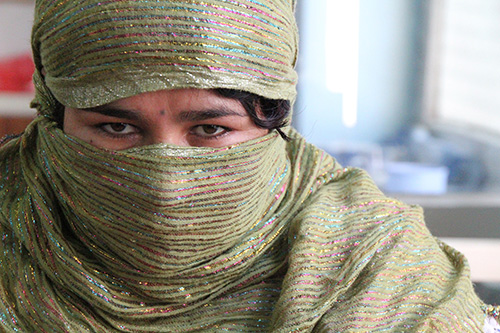News
Phone line answers burning questions of Afghan youth
- 09 November 2015
News
KABUL, Afghanistan – "We had a case where one of the callers, a girl, was pregnant, and when she told her boyfriend about her condition, he disappeared. She was desperate when she called us, even considering committing suicide," said Shkullah Hassanyar. Dr. Hassanyar is part of a team of doctors who staff the Youth Health Line, the first-ever phone line designed to provide sensitive health information and assistance to Afghan youth.
Adolescence is a difficult time for many people – and it is all the more difficult in Afghanistan, where major public health concerns include violence against women and girls, widespread drug addition, as well as stress and depression. Girls also face high rates of child marriage and early pregnancy, which carry heightened risks of pregnancy-related injury and death.
Yet young people often lack the tools to navigate these treacherous waters. Over 3 million children are not in school, according to the Ministry of Education. Even for those who attend school, questions about sexual and reproductive health are difficult to raise in this conservative community, and many schools lack of qualified teachers able to address these sensitive issues.

The health line, launched by UNFPA and the Ministry of Public Health in 2012, offers young people an anonymous way to receive accurate and non-judgmental health information and advice, from health professionals.
"Most of the time young people don't have anyone to trust with some of the issues we address here," said Dr. Khaksar, who joined the Youth Health Line in 2013. "We can't see their faces and they can't see ours, so it is easier for them to be comfortable and for us to quickly understand the problem and find the way to help them."
The health line has quickly grown, from two doctors in 2012 to eight in 2014. The number of callers has risen steeply over the last year, from 1,500 each month to more than 3,000.
The calls are free, and the phone number is easy to remember: 120. Services are available every day in both Dari and Pashto.
And the doctors offer a wealth of information – from basic lessons on puberty and anatomy to information about newborn care, nutrition and human rights. They also refer callers to appropriate health and protection services.
If a caller is interested, she or he may visit the health line office or seek treatment and further advice at the youth-friendly clinic managed by the Afghan Family Guidance Association (AFGA). The AFGA operates the Youth Health Line in partnership with UNFPA.
Dr. Hassanyar said she invited the pregnant youth who called in a panic to come to the health line office.
“We advised her to talk to her mother and invited the family here to discuss the problem," Dr. Hassanyar explained.

The girl was able to receive in-person counselling and support. In the end, her boyfriend returned to her life, and ultimately the two were married.
Most of the calls received by the counsellors involve forced marriage, domestic violence, HIV and family planning. Among male callers, unemployment-related depression and stress are major topics.
Despite the hardships they must address every day, the counsellors say their work is interesting and fulfilling.
"I am married and have children, but this work has made me aware of issues related to youth health that I didn't know about," Anahita Danishyar, one of the doctors, told UNFPA.
"I really enjoy working with young people," Dr. Hassanyar said. "I like that the young people feel very comfortable talking to us and that I can find ways to help them."